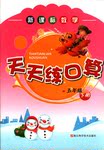
| |||||||||||||||||||||||||||||||||||||||||||||||||||||||||||||||||||||||||
 口算小状元口算速算天天练系列答案
口算小状元口算速算天天练系列答案 天天练口算系列答案
天天练口算系列答案科目:高中英语 来源: 题型:阅读理解
阅读下面这首乐府诗,完成下列各题。
菩萨蛮
王安石【注】
数间茅屋闲临水,窄衫短帽垂杨里。花是去年红,吹开一夜风。
梢梢新月偃,午醉醒来晚。何物最关情,黄鹂三两声。
【注】:此词为王安石晚年罢相后回到金陵卜居于半山时所作。
词的开篇就点出“闲”字,请结合全词,谈谈作者是怎样表现“闲”字的?
素洁平易而又含蓄深沉是这首词的基本特色,请你就“含蓄深沉”这一特色谈谈对这首词的理解。
查看答案和解析>>
科目:高中英语 来源: 题型:阅读理解
第三部分 阅读理解(共15小题;每小题2分,满分30分)
请认真阅读下列短文,从短文后各题所给的A、B、C、D四个选项中,选出最佳选项,并在答题卡上将该项涂黑。
A
Scars of Love
Some years ago on a hot summer day in south Florida a little boy decided to go for a swim in the old swimming hole behind his house. In a hurry to dive into the cool water, he ran out of the back door, leaving behind shoes, socks and shirt as he went.
He flew into the water, not realizing that as he swam toward the middle of the lake, an alligator(短吻鳄) was getting close. The mother in the house was looking out of the window and saw the two as they got closer and closer together. In great fear, she ran toward the water, yelling to her son as loudly as she could. Hearing her voice, the little boy became alarmed and made a U-turn to swim to his mother. It was too late. Just as he reached her, the alligator reached him. From the dock, the mother grabbed her little boy by the arms just as the alligator snatched (抓住) his legs. That began an unbelievable tug-of-war (拔河比赛) between the two. The alligator was much stronger than the mother, but the mother was much too passionate to let go. A farmer happened to drive by, heard their screams, rushed from his truck, took aim and shot the alligator.
Remarkably, after weeks and weeks in the hospital, the little boy survived. His legs were extremely scarred (留下伤疤) by the terrible attack of the animal. And on his arms, were deep scratches where his mother’s fingernails dug into his flesh in her effort to hang on to the son she loved.
The newspaper reporter, who interviewed the boy after the trauma (外伤), asked if he would show him his scars. The boy lifted the pant legs. And then, with obvious pride, he said to the reporter, “Look at my arms. I have great scars on my arms, too. I have them because my mum wouldn’t let go.”
You and I can identify with (认同) that little boy. We have scars, too. Not from an alligator, but the scars of a painful past. Some of those scars are unsightly and have caused us deep regret. But, some wounds, my friends, are because we have refused to let go.
56. The underlined part “the two” in the second paragraph refers to ______.
A. the alligator and the mother B. the mother and the son
C. the driver and the alligator D. the son and the alligator
57. From the passage we can infer ________.
A. The mother was unwilling to let the alligator go
B. The mother was actually stronger than the alligator
C. The son was proud of his scars on his arms
D. The son was ashamed of his scars on his legs
58. According to the last paragraph, what is the writer’s real meaning?
A. To forget the past is to betray. B. We should forget the scars.
C. Wounds are different from scars. D. We should learn to let go sometimes.
查看答案和解析>>
湖北省互联网违法和不良信息举报平台 | 网上有害信息举报专区 | 电信诈骗举报专区 | 涉历史虚无主义有害信息举报专区 | 涉企侵权举报专区
违法和不良信息举报电话:027-86699610 举报邮箱:58377363@163.com